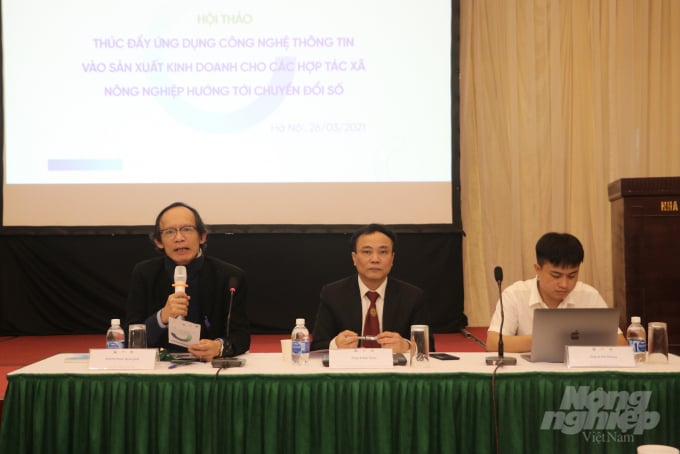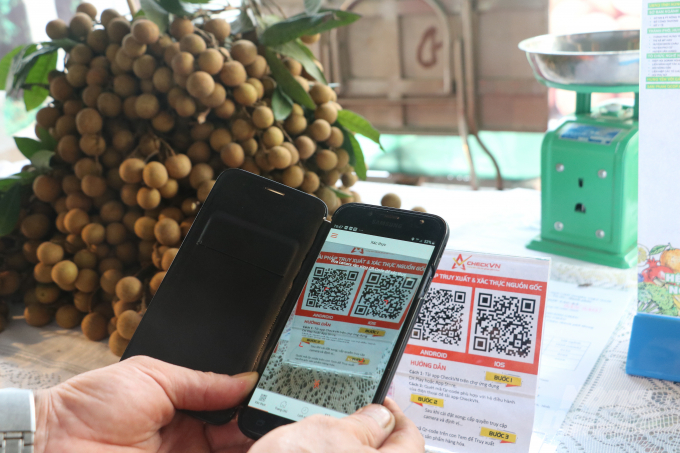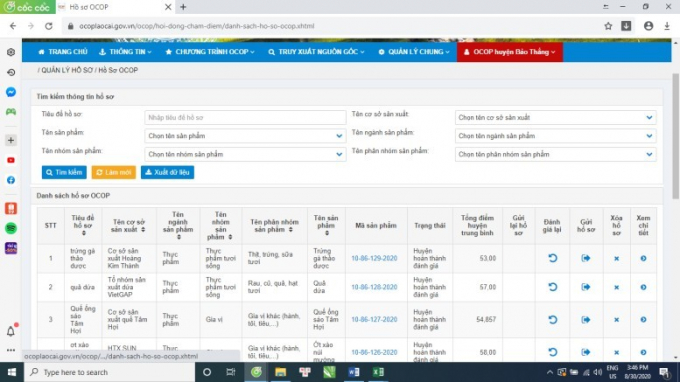June 21, 2025 | 02:53 GMT +7
June 21, 2025 | 02:53 GMT +7
Hotline: 0913.378.918
June 21, 2025 | 02:53 GMT +7
Hotline: 0913.378.918
A workshop on Promoting Information Technology in Production and Business for Agricultural Cooperatives in the direction of digital transformation took place on March 26 in Hanoi.
Speaking at the workshop, Mr. Le Duc Thinh, Director of Department of Economic Cooperation and Rural Development (Ministry of Agriculture and Rural Development), said that agriculture has been identified as one of eight sectors with priority for digital transformation according to the National Digital Transformation Program to 2025, with a vision to 2030 which has been approved by the Prime Minister.
The program also includes some areas in agriculture to be digitalized including the crop production conversion, husbandry, product traceability, and farming routine check. Covid-19 has accelerated the digitization process as consumers have to change their habits and make use of e-commerce. Accordingly, farmers have to upload their products on the e-market and participate in the process to digitize their products.

An overview of the worshop. Photo: HG
The application of modern technologies has contributed to a rapid change in Vietnam's agricultural sector. The Internet and artificial intelligence are gradually simplifying and streamlining the collection, inspection, and distribution of overall agricultural resources. The application of robotics in agriculture can also help improve production efficiency and increase productivity …
Unmanned aerial vehicles (UAVs) are used to spray pesticides and other plant protection substances. Precision agricultural and garden management programs and software are being applied to optimize the use of resources such as water and fertilizers ...
Associate Professor and Doctor Hoang Huu Hanh and Dr. Pham Vu Minh Tu from the Posts and Telecommunications Institute of Technology said that to implement digital transformation in the agricultural sector, it was necessary to focus on building major data systems and intellectual base of land, plants, animals, and aquaculture. The building of an (aerial and on-ground) integrated monitoring and supervising network for agricultural activities to provide information about the environment, weather, and soil quality to improve crop yield and quality, was also needed.
Along with that, according to the two experts, it was necessary to standardize and automate the processes of agricultural production, business, management, origin monitoring, and product supply chain so that to approach a synchronized and mechanized agriculture.
Models of digital technology application and digital transformation to create a smart rural area should also be built, they added.
The two experts explained some current obstacles of the agricultural sector focusing on the labor force qualification. They said unproperly trained workers account for a large number of the farmers as most of them are working based on experiences passed down from the previous generations.
This labor resource is also limited in obtaining scientific and technical progress. Therefore, it is necessary to train farmers to apply digital skills in production, supply, distribution, forecasting, and promoting e-commerce in agriculture, according to the experts.
Mr. Le Anh Hoang, Director of Digital Agriculture Cooperative (Hanoi), said that the presence of a program called One Product Per Commune (OCOP) has created many opportunities for OCOP objects (OCOP product manufacturers) to standardize their product quality, enhance value, orientate production towards good provision to fully meet the requirements of domestic markets and beyond towards the export markets. OCOP is a program of economic development in rural areas in the direction of internal development and adding value increase, according to him.
It can be said that, up to now, the OCOP program of Vietnam has achieved many important achievements, many local specialty products are preserved, developed and promoted, ensuring the livelihoods for people and rural farmers.
'In the future, for the OCOP program to be more successful, along with the efforts of OCOP manufacturers and the participation and support of the state, the factors of OCOP digital transformation are also extremely important to help boost the program’s development more progressively and fast,” Mr. Hoang emphasized.

"OCOP digital transformation" should come from the needs of production and business activities of OCOP subjects. Photo: TL.
According to Mr. Hoang, to undertake the “OCOP digital transformation”, it is necessary to derive from the needs of production and business activities of the OCOP subjects as well as the state management and the goals towards a technological application simplified and convenient for users.
Accordingly, we should avoid making the program a mouthy event that causes just burdens, imposes technologies, and wastes time for people. The OCOP digital transformation needs to pass through steps such as: identifying the applicable objects (people, processes, ...); determine which technology to apply; digitize processes optimally, and effectively manage and exploit data using technology applications.
In essence, OCOP products, like other products going to the markets, should be standardized their quality, through the standardized production processes and comply with regulations under the management and supervision of State agencies and government authorities.
Therefore, to achieve a comprehensive and effective OCOP digital transformation, in addition to digitally transform the program itself, it is vital to digitalize in related fields of agriculture and agricultural management...
Mr. Le Anh Hoang added that the model of OCOP management digital transformation program at the peak time of Covid-19 in Lao Cai province was a typical example of OCOP digital transformation.
As of April 2020, when the social distancing was undergoing, the recommendations to limit human gathering imposed by authorities had affected the progress of OCOP product classification, training and consultancy activities. Therefore, Lao Cai had to research and put into operation another measure for management and administration of the OCOP scheme for the whole province.

The province's software system has been managing and updating data for over 50 products having been rated and many others being in the process of evaluation. Photo: TL.
Up to now, the province's system software has been managing and updating data for over 50 products having been rated and many others being in the process of evaluation.
The OCOP database software system includes many contents such as Website ocoplaocai.gov.vn; OCOP software, digital map integrated on the website and the mobile application.
The OCOP database system software will help OCOP starred products manufacturers manage their production diary, create and manage traceability data, print QR labels to stick on products, create and update OCOP record documentation, undertake the online submission of the OCOP grading assessment from the district to the provincial level, preserve and digitize necessary records during the digitalizing process. Through the software, OCOP manufacturers and customers can send questions to State management agencies at all levels about issues that need to be solved and help them promote their products on the website ocoplaocai.gov.vn...
Translated by Kim Khuyen
![Turning wind and rain into action: [9] Digitizing hydrometeorological data in response to climate change](https://t.ex-cdn.com/nongnghiepmoitruong.vn/608w/files/news/2025/06/17/z6704423696987_15fd32ffc26d590d204d520c9dac6786-nongnghiep-165943.jpg)
(VAN) Farmers have begun accessing hydrometeorological applications to adjust their cropping schedules, aiming to ensure productivity and adapt to climate change.
![Turning wind and rain into action: [8] Real-time salinity detection and early warning technology](https://t.ex-cdn.com/nongnghiepmoitruong.vn/608w/files/news/2025/06/17/z6704423696987_15fd32ffc26d590d204d520c9dac6786-nongnghiep-151127.jpg)
(VAN) Thanks to the integration of modern hydrological-hydraulic models, remote sensing technologies, and artificial intelligence, the accuracy of hydrological forecasting has significantly improved.
![Turning wind and rain into action: [7] Early disaster warnings help marine farmers minimize losses](https://t.ex-cdn.com/nongnghiepmoitruong.vn/608w/files/news/2025/06/17/z6704423696987_15fd32ffc26d590d204d520c9dac6786-nongnghiep-142942.jpg)
(VAN) In recent years, thanks to early disaster warnings and forecasting, marine farmers in Khanh Hoa province have been able to reduce risks and losses, thereby improving production efficiency.
![Turning wind and rain into action: [6] ‘Four on-the-spot’ disaster management software](https://t.ex-cdn.com/nongnghiepmoitruong.vn/608w/files/news/2025/06/17/e5a48259d6a262fc3bb3-nongnghiep-183800.jpg)
(VAN) By simply activating the scenario on the disaster management software, the relevant authorities immediately know how many households need to be evacuated, where to evacuate them to, and by what means of transportation…
![Turning wind and rain into action: [5] Hue applies modern technology in disaster forecasting](https://t.ex-cdn.com/nongnghiepmoitruong.vn/608w/files/news/2025/06/17/z6704423696987_15fd32ffc26d590d204d520c9dac6786-nongnghiep-093938.jpg)
(VAN) In Hue city, modern technology has recently been applied in meteorological and hydrological forecasting and warning, helping to reduce the damage caused by natural disasters.

(VAN) A cutting-edge farming technique being implemented on an experimental ranch in Arizona's Sonoran Desert has already saved a billion gallons of water over five years, according to Civil Eats.

(VAN) Poultry and pig production and the environment can be boosted through enhanced water technology, according to new research.